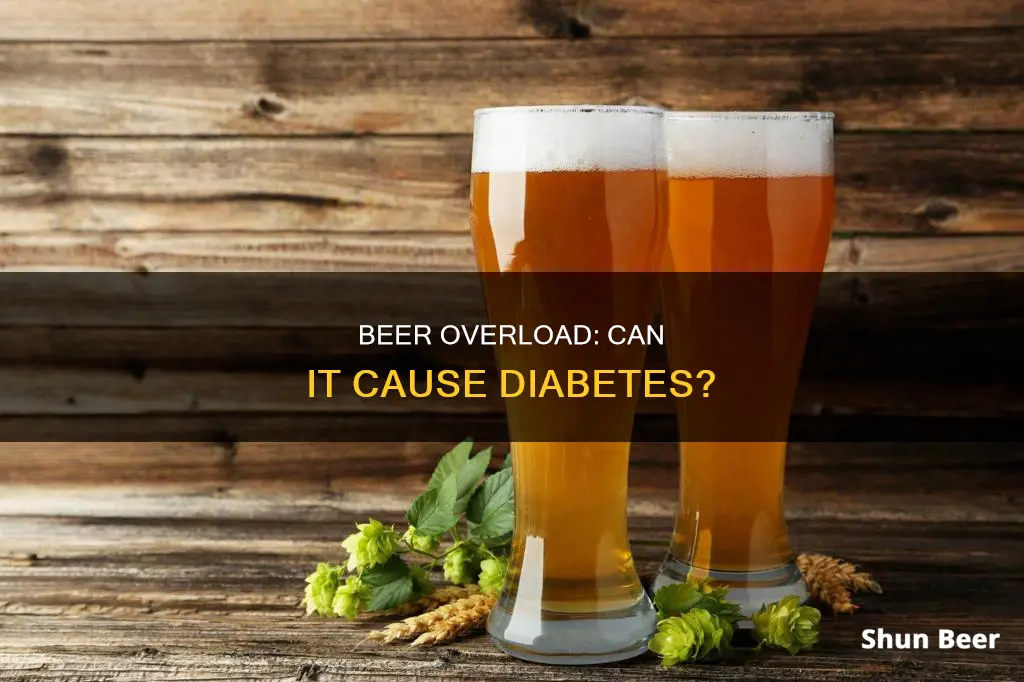
Alcohol and diabetes can be a tricky combination. Alcohol can impact the body's ability to regulate blood sugar, and this can be particularly dangerous for people with diabetes. Excessive alcohol consumption is associated with an increased risk of type 2 diabetes, but the relationship between alcohol and diabetes is complex and not fully understood. While moderate alcohol consumption may not increase the risk of type 2 diabetes, heavy drinking can be detrimental to blood sugar management and overall health.
| Characteristics | Values |
|---|---|
| Does alcohol cause diabetes? | Alcohol does not cause diabetes. However, according to the American Diabetes Association (ADA), heavy consumption and zero consumption increase the risk. |
| Alcohol's effect on blood sugar | Alcohol can cause blood glucose levels to rise or fall, depending on how much you drink. |
| Alcohol's effect on the liver | Alcohol prevents the liver from doing its job of regulating blood sugar. |
| Alcohol and an empty stomach | Drinking on an empty stomach increases the risk of hypoglycaemia. |
| Alcohol and diabetes medication | Alcohol can interact with diabetes medications, such as sulphonylureas and meglitinides. |
| Alcohol and weight gain | Alcoholic drinks often contain a lot of calories, which can lead to weight gain. |
| Alcohol and neuropathy | Alcohol can worsen neuropathy (nerve damage). |
| Alcohol and eye disease | Alcohol can increase the risk of diabetic eye disease. |
What You'll Learn

Alcohol interacts with diabetes medications
Alcohol and Diabetes Medications
Metformin
Doctors advise against drinking alcohol while taking metformin, a common medication for treating type 2 diabetes. Both metformin and alcohol put stress on the liver, and when combined, they can cause a range of side effects, including gastrointestinal complications such as abdominal pain, indigestion, and heartburn. The combination can also lead to a rare but dangerous condition called lactic acidosis, which can be life-threatening. Additionally, metformin can cause hypoglycemia, and when combined with alcohol, the risk of hypoglycemia increases significantly.
Semaglutide and Tirzepatide
Moderate alcohol consumption generally does not affect blood sugar levels if diabetes is under control. However, it is important to consult a doctor before consuming alcohol while taking these medications, as alcohol can change blood sugar levels. It is recommended to avoid alcohol if diabetes is not well-controlled or if there are complications such as high triglycerides, neuropathy, or pancreatitis.
Insulin
The combination of alcohol and insulin can result in both hypoglycemia (low blood sugar) and hyperglycemia (high blood sugar), depending on the amount and frequency of alcohol consumption.
General Precautions for People with Diabetes
- It is important to consult a healthcare provider before consuming alcohol to understand its impact on your health condition.
- If you choose to drink, do so in moderation, following the recommended guidelines: one drink per day for women and up to two drinks per day for men.
- Avoid drinking on an empty stomach, and stay hydrated by drinking water.
- Monitor your blood sugar levels before, during, and after drinking alcohol, and before going to bed.
- Wear a diabetes medical ID tag to help identify your medical condition in case of an emergency.
- Educate your friends and family about the symptoms of low blood sugar so they can recognize and respond accordingly.
Drinking Beer Outside in Wawatosa, Wisconsin: Is It Allowed?
You may want to see also

Alcohol prevents the liver from regulating blood sugar
Alcohol can have a significant impact on the liver's ability to regulate blood sugar levels. When a person consumes alcohol, the liver, which is responsible for breaking it down, prioritises this task over releasing glucose into the bloodstream. This can result in a drop in blood sugar levels, particularly for those who take insulin or medications that increase insulin production.
The liver typically breaks down one standard alcoholic drink per hour. However, if an individual consumes more alcohol than the liver can process, the excess alcohol moves throughout the body and is eliminated through the lungs, kidneys, and skin via urine and sweat.
Alcohol can cause blood glucose levels to rise or fall, depending on the amount consumed. Alcoholic drinks tend to be high in sugar, which can cause a spike in blood sugar levels as the sugar enters the bloodstream. This spike can be dangerous for people with diabetes, especially if they are also taking insulin or certain medications, as it may lead to hypoglycaemia or "insulin shock".
The effects of alcohol on blood sugar typically occur in two phases. Initially, blood sugar levels increase as the sugar from alcohol enters the bloodstream, peaking when the maximum amount of sugar from the alcohol has been absorbed, which can take about 1-2 hours. Then, the body releases insulin to bring the blood sugar levels down, and the liver inhibits the release of additional glucose. As a result, blood sugar levels decrease.
Once the body has absorbed all the sugar it can from the alcohol, it starts to use up the sugar, further decreasing blood sugar levels. At this point, alcohol impairs liver function and can prevent the liver from releasing enough glycogen to maintain healthy blood glucose levels. This can lead to a prolonged period of low blood sugar as long as the alcohol continues to affect the liver's function.
For individuals with diabetes, it is crucial to monitor blood sugar levels when consuming alcohol and to consult with a physician about the potential risks and complications. The American Diabetes Association recommends that diabetics limit their alcohol intake to no more than one drink per day for women and avoid drinking on an empty stomach or when blood sugar levels are already low.
Antibiotics and Alcohol: A Risky Mix?
You may want to see also

Drinking on an empty stomach increases the risk of hypoglycaemia
Drinking on an empty stomach exacerbates this issue by making it extremely difficult for the liver to release glucose into the bloodstream. This results in lower blood sugar levels and an increased risk of hypoglycaemia. Therefore, it is essential to eat food, especially carbohydrates, before drinking alcoholic beverages.
The symptoms of hypoglycaemia include lightheadedness, dizziness, shakiness, trembling, hunger, sweating, difficulty concentrating, and changes in mood. Severe hypoglycaemia can lead to loss of consciousness and coma, requiring immediate medical attention.
People with diabetes need to be particularly cautious about their alcohol consumption due to its effects on blood sugar levels. Alcohol can interact with diabetes medications, further increasing the risk of hypoglycaemia. Additionally, drinking alcohol can contribute to conditions that cause diabetes, such as chronic pancreatitis and being overweight or obese.
It is important to note that alcohol consumption can also lead to higher blood sugar levels in certain individuals, especially those who are well-fed. Therefore, the relationship between alcohol and blood sugar levels is complex and influenced by various factors.
Insulin and Beer: Is It Safe to Drink?
You may want to see also

Alcohol can cause hypoglycaemia
Drinking on an empty stomach further increases the risk of hypoglycaemia, as the liver struggles to release glucose into the bloodstream. Binge drinking and heavy drinking are also risk factors for hypoglycaemia, especially for people with type 1 diabetes. Alcoholic drinks are often high in calories and sugar, which can lead to weight gain and increase the risk of developing type 2 diabetes.
Symptoms of hypoglycaemia include dizziness, hunger, sweating, and trembling. In severe cases, hypoglycaemia can lead to seizures or loss of consciousness. It is important to treat low blood sugar levels immediately and to seek medical attention if levels drop below 55 mg/dL.
To prevent hypoglycaemia, it is recommended that people with diabetes who choose to drink alcohol do so in moderation, eat a carbohydrate-rich meal before drinking, and closely monitor their blood sugar levels.
Low Alcohol Tolerance? How to Enjoy Beer Again
You may want to see also

Alcohol increases the risk of developing type 2 diabetes
Excessive alcohol consumption is associated with an increased risk of developing type 2 diabetes. While moderate alcohol consumption does not raise the risk, heavy drinking can disrupt metabolic processes and impact blood sugar control, making it harder for people with diabetes to manage their condition.
How Alcohol Affects Blood Sugar
Alcohol interferes with the body's ability to regulate blood sugar levels. When you drink, your liver has to work to remove alcohol from your bloodstream instead of regulating blood sugar. This interference can lead to a dangerous drop in blood sugar levels, known as hypoglycaemia or a "hypo". This is particularly risky for people with diabetes, as they may already have low blood sugar levels.
Alcohol and Weight Gain
Alcoholic drinks are often high in calories and can contribute to weight gain. Being overweight or obese is a risk factor for developing type 2 diabetes. Therefore, drinking alcohol can indirectly increase the risk of type 2 diabetes by promoting weight gain.
Alcohol and Insulin Resistance
Regular heavy drinking can reduce the body's sensitivity to insulin, which is a trigger for type 2 diabetes. Alcohol can also worsen diabetes-related medical complications, such as disturbances in fat metabolism, nerve damage, and eye disease.
Alcohol and Pancreatitis
Chronic pancreatitis is a common side effect of heavy drinking and can lead to the development of type 2 diabetes. Additionally, alcohol can interact with diabetes medications, affecting their effectiveness and potentially leading to dangerous side effects.
Guidelines for Drinking with Diabetes
If you have diabetes and choose to drink alcohol, it is important to stay within the recommended guidelines for low-risk drinking and not exceed 14 units of alcohol per week. It is also crucial to never drink on an empty stomach, as this increases the risk of hypoglycaemia. Always test your blood sugar levels before drinking and be aware of the signs of hypoglycaemia, as they can be similar to the symptoms of intoxication.
Terbinafine and Beer: Is It Safe to Drink?
You may want to see also
Frequently asked questions
Excess alcohol intake is associated with an increased risk of type 2 diabetes. However, the relationship between alcohol and type 2 diabetes is complex. Alcohol can impact the body's ability to regulate blood sugar, but it does not directly cause diabetes.
Alcohol interferes with the liver's ability to regulate blood sugar. The liver is responsible for storing and releasing glycogen, the stored form of glucose, to maintain stable blood sugar levels. When you consume alcohol, the liver prioritizes breaking it down over its role in blood sugar regulation. This interference can lead to both high and low blood sugar levels, depending on various factors.
Drinking alcohol can worsen blood sugar control in people with diabetes and increase the risk of diabetes-related health complications. Alcohol can also interact with certain diabetes medications, such as sulphonylureas and insulin, increasing the risk of hypoglycemia or "insulin shock," which is a medical emergency. Additionally, alcohol is often high in calories, which can contribute to weight gain and further increase the risk of developing type 2 diabetes.







